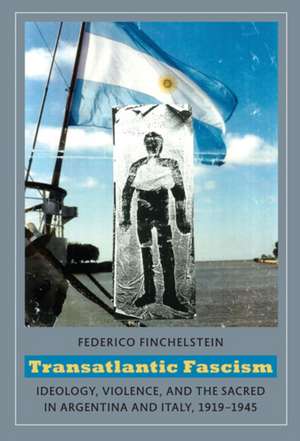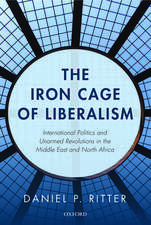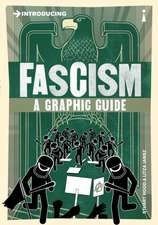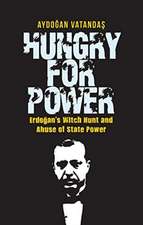Transatlantic Fascism – Ideology, Violence, and the Sacred in Argentina and Italy, 1919–1945
Autor Federico Finchelsteinen Limba Engleză Paperback – 10 ian 2010
Preț: 266.18 lei
Nou
Puncte Express: 399
Preț estimativ în valută:
50.94€ • 55.31$ • 42.79£
50.94€ • 55.31$ • 42.79£
Carte tipărită la comandă
Livrare economică 22 aprilie-06 mai
Preluare comenzi: 021 569.72.76
Specificații
ISBN-13: 9780822346128
ISBN-10: 0822346125
Pagini: 344
Dimensiuni: 168 x 232 x 23 mm
Greutate: 0.5 kg
Editura: MD – Duke University Press
ISBN-10: 0822346125
Pagini: 344
Dimensiuni: 168 x 232 x 23 mm
Greutate: 0.5 kg
Editura: MD – Duke University Press
Recenzii
Transatlantic Fascism is a fresh examination of fascism in Argentina from the perspective of its transnational connections. Federico Finchelstein provides new insight into fascism and its impact in Argentina.--Donna Guy, author of Women Build the Welfare State: Performing Charity and Creating Rights in Argentina, 1880-1955
Federico Finchelstein displays an exceptional combination of talents in Transatlantic Fascism: imagination tempered by diligence and meticulousness, independence tempered by judiciousness. His theoretical clarity and deep empirical research have forged a rich, intellectually rewarding, and important study of fascism. The books transnational perspective sheds much-needed light on a conceptually elusive ideology and political phenomenon.--Jose C. Moya, author of Cousins and Strangers: Spanish Immigrants in Buenos Aires, 1850-1930In this innovative, impressively researched work, Federico Finchelstein takes an ambitious comparative approach to the historical study of fascism. He shows both how fascism was a transnational ideology and how that ideology was inflected and joined with at times violent practices according to different national traditions. His close inquiry into the Italian-Argentine connection sheds new light on a complex set of problems, including dimensions of fascism related to religion and to the manner in which fascism was understood and experienced by its committed activists. This book is important not only for specialists in European and Latin American history but for all historians and social scientists interested in problems of comparative history and methodology.--Dominick LaCapra, Professor of History and Bowmar Professor of Humanistic Studies, Cornell UniversityIn this original and refreshing work on the history of fascism between Europe and Latin America, Federico Finchelstein elaborates a new concept--transatlantic fascism--that predictably will raise a large debate among historians. Written from the perspective of global history, this book rethinks the history of fascism in its international, not only European, dimension.--Enzo Traverso, author of The Origins of Nazi Violence
"Transatlantic Fascism is a fresh examination of fascism in Argentina from the perspective of its transnational connections. Federico Finchelstein provides new insight into fascism and its impact in Argentina."--Donna Guy, author of Women Build the Welfare State: Performing Charity and Creating Rights in Argentina, 1880-1955 "Federico Finchelstein displays an exceptional combination of talents in Transatlantic Fascism: imagination tempered by diligence and meticulousness, independence tempered by judiciousness. His theoretical clarity and deep empirical research have forged a rich, intellectually rewarding, and important study of fascism. The book's transnational perspective sheds much-needed light on a conceptually elusive ideology and political phenomenon."--Jose C. Moya, author of Cousins and Strangers: Spanish Immigrants in Buenos Aires, 1850-1930 "In this innovative, impressively researched work, Federico Finchelstein takes an ambitious comparative approach to the historical study of fascism. He shows both how fascism was a transnational ideology and how that ideology was inflected and joined with at times violent practices according to different national traditions. His close inquiry into the Italian-Argentine connection sheds new light on a complex set of problems, including dimensions of fascism related to religion and to the manner in which fascism was understood and experienced by its committed activists. This book is important not only for specialists in European and Latin American history but for all historians and social scientists interested in problems of comparative history and methodology."--Dominick LaCapra, Professor of History and Bowmar Professor of Humanistic Studies, Cornell University "In this original and refreshing work on the history of fascism between Europe and Latin America, Federico Finchelstein elaborates a new concept--transatlantic fascism--that predictably will raise a large debate among historians. Written from the perspective of global history, this book rethinks the history of fascism in its international, not only European, dimension."--Enzo Traverso, author of The Origins of Nazi Violence
Federico Finchelstein displays an exceptional combination of talents in Transatlantic Fascism: imagination tempered by diligence and meticulousness, independence tempered by judiciousness. His theoretical clarity and deep empirical research have forged a rich, intellectually rewarding, and important study of fascism. The books transnational perspective sheds much-needed light on a conceptually elusive ideology and political phenomenon.--Jose C. Moya, author of Cousins and Strangers: Spanish Immigrants in Buenos Aires, 1850-1930In this innovative, impressively researched work, Federico Finchelstein takes an ambitious comparative approach to the historical study of fascism. He shows both how fascism was a transnational ideology and how that ideology was inflected and joined with at times violent practices according to different national traditions. His close inquiry into the Italian-Argentine connection sheds new light on a complex set of problems, including dimensions of fascism related to religion and to the manner in which fascism was understood and experienced by its committed activists. This book is important not only for specialists in European and Latin American history but for all historians and social scientists interested in problems of comparative history and methodology.--Dominick LaCapra, Professor of History and Bowmar Professor of Humanistic Studies, Cornell UniversityIn this original and refreshing work on the history of fascism between Europe and Latin America, Federico Finchelstein elaborates a new concept--transatlantic fascism--that predictably will raise a large debate among historians. Written from the perspective of global history, this book rethinks the history of fascism in its international, not only European, dimension.--Enzo Traverso, author of The Origins of Nazi Violence
"Transatlantic Fascism is a fresh examination of fascism in Argentina from the perspective of its transnational connections. Federico Finchelstein provides new insight into fascism and its impact in Argentina."--Donna Guy, author of Women Build the Welfare State: Performing Charity and Creating Rights in Argentina, 1880-1955 "Federico Finchelstein displays an exceptional combination of talents in Transatlantic Fascism: imagination tempered by diligence and meticulousness, independence tempered by judiciousness. His theoretical clarity and deep empirical research have forged a rich, intellectually rewarding, and important study of fascism. The book's transnational perspective sheds much-needed light on a conceptually elusive ideology and political phenomenon."--Jose C. Moya, author of Cousins and Strangers: Spanish Immigrants in Buenos Aires, 1850-1930 "In this innovative, impressively researched work, Federico Finchelstein takes an ambitious comparative approach to the historical study of fascism. He shows both how fascism was a transnational ideology and how that ideology was inflected and joined with at times violent practices according to different national traditions. His close inquiry into the Italian-Argentine connection sheds new light on a complex set of problems, including dimensions of fascism related to religion and to the manner in which fascism was understood and experienced by its committed activists. This book is important not only for specialists in European and Latin American history but for all historians and social scientists interested in problems of comparative history and methodology."--Dominick LaCapra, Professor of History and Bowmar Professor of Humanistic Studies, Cornell University "In this original and refreshing work on the history of fascism between Europe and Latin America, Federico Finchelstein elaborates a new concept--transatlantic fascism--that predictably will raise a large debate among historians. Written from the perspective of global history, this book rethinks the history of fascism in its international, not only European, dimension."--Enzo Traverso, author of The Origins of Nazi Violence
Notă biografică
Textul de pe ultima copertă
"In this original and refreshing work on the history of fascism between Europe and Latin America, Federico Finchelstein elaborates a new concept--transatlantic fascism--that predictably will raise a large debate among historians. Written from the perspective of global history, this book rethinks the history of fascism in its international, not only European, dimension."--Enzo Traverso, author of "The Origins of Nazi Violence"
Cuprins
Descriere
Transnational exploration of the ideological workings of Argentine fascism, both critically and in its own terms, asking why secular Argentina developed the most widespread, reactionary Catholic political movement in the hemisphere.














